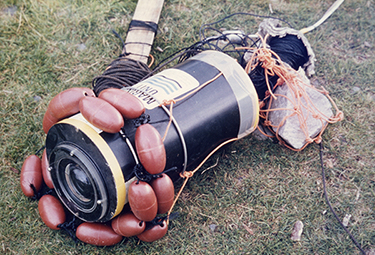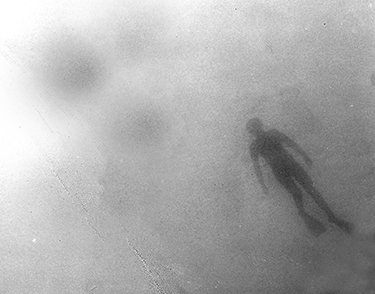Silhouette Video System. Loch Morar, 1975-6
In 1975 we introduced a much safer idea than the submersible camera hide Machan but on the same principle; this Underwater Video Camera pointed straight upwards with a wide angle lens. By 1976 our expedition members were safely in a tent on shore over 300m away watching the screen and ready to record intrusions of interest. In the clear water of Loch Morar, we could obtain ranges of over 30m with a similar width of coverage across the surface.
This ‘silhouette technique’ vastly extended the volume of water under surveillance but also would have made it possible to see the whole-body outline of a large creature. This would have been much more useful in identification than the conventional flash illuminated time lapse photography used at Loch Ness with its controversial claims of isolated ‘body parts’.
Additionally, because the video recorded movement, images such as silt swirls and tree stumps were not frozen out of context and misinterpreted as at Loch Ness. We also hoped that a creature’s movements would yield clues to identity. Reptiles and fish undulate horizontally; mammals vertically. Our 1976 expedition was supported by a contingent of Royal Engineers undergoing watermanship training which allowed us to push our outstations along the whole 12 mile length of Loch Morar. The surface station had a crew of three whenever possible who were on duty for 24 hours. Crew, batteries and supplies were replaced daily around midday to avoid disturbance during the critical dawn and dusk periods.
Sadly, the technique was too good to enable claims of monsters to be made!
Return to Equipment Index |

Under water camer rigged for viewing upwards to film silhouettes.

Tethered to the bottom.

Looking up towards the light. the silhouette principle demonstration.. |
